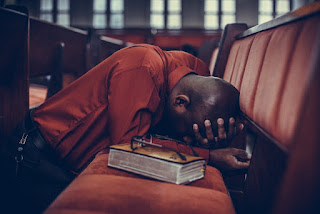Agency
Readings
Commentary
Matthew’s account of the Beatitudes begins with Jesus seeing the crowds. In that crowd he must have seen those who were peacemakers, the poor in spirit, the pure in heart, men and women who mourned, and those who hungered for justice. In the Beatitudes Jesus not only names people’s struggles, he names what they will be: the children of God and inheritors of the Kingdom of Heaven.
Howard Thurman, African American theologian and spiritual advisor to Rev. Dr. Martin Luther King, Jr., believed, “the religion that Jesus lived produced the kind of life for Him that identifies with the downtrodden, outcast, broken, and disinherited of the world.” Yet, Thurman also believed that, “It cannot be denied that too often the weight of the Christian movement has been on the side of the strong and the powerful and against the weak and oppressed – this, despite the gospel.”
If we listen hard enough, we will hear a diversity of voices crying out under the weight of oppression. Action is needed today to bring love, hope, justice and liberation for us and others in the future. Oppression of any kind demands that each of us chooses to engage in order to eradicate the injustice(s) that break our hearts open.
In prayer we align our hearts with the heart of God, to love what God loves and to love as God loves. Prayer with integrity therefore aligns and unites us – beyond our divisions – to love what, whom and how God loves, and to express this love in our actions.
Let us all work together with God in our hope and commitment to shut injustice’s mouth and eradicate oppression in all areas of our society.
Reflection
I see you there,
You – blessed ones,
You – poor in spirit,
You – mourners, meek ones and merciful ones.
I hear your stomachs rumble with hunger.
Is righteousness enough to satiate your thirst,
like rain upon the earth?
You have had your fill of the schemes of crafty ones,
been force fed so-called wisdom by the wily.
With pure and undivided hearts
you train your eyes upon God’s cause – to lift high the perceived lowly,
to bring to safety any who are in danger of being trampled
by pride-filled footsteps of trespassers,
or stabbed by weaponised words hell-bent on cutting down and dehumanising.
Shut the mouth of injustice, God,
tear down the strongholds of the power-hungry
and give us the desire and the strength
to rebuild a realm
where all who are wounded are brought comfort,
where the inheritance is shared by all,
where swords and shields are beaten
into tools for sowing peace and reconciliation,
where healing abounds
and mouths open to sing stories of shared blessing and hope.
Prayer
God of justice,
Empower us to be agents of your grace and mercy.
Bless us with the courage to relinquish our power.
Bless us with the humility to stand with the oppressed.
Bless us with the integrity to love our neighbours as we ourselves would seek to be loved.
Questions
- Can you think of a time when you felt powerless? How would you have liked others to respond?
- Think about the ways you might have influence in your local community? How might you use that influence to help those who feel powerless?
- Around the world whole communities find themselves powerless as a result of corruption and exploitation. How might the choices we make in our daily lives impact these situations?
Go and Do
(see www.ctbi.org.uk/goanddo)
- Try volunteering for a local community organisation.
- Where do you see people being denied agency in your local community? Explore ways to take action that raises awareness.
- In the work of international development there is increasing recognition of the need to address the legacy of injustice and exploitation and restore to marginalised communities the power to make decisions about their own future. Explore ways to help further this work through your giving and advocacy.













